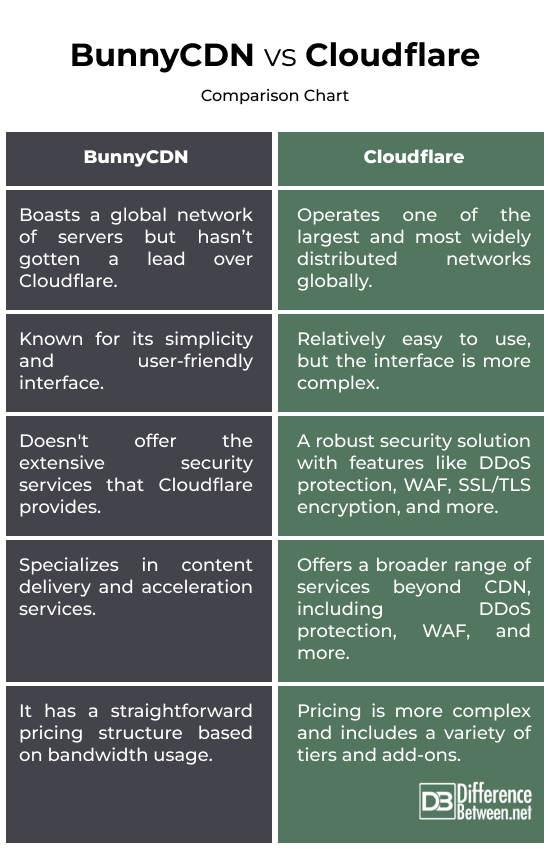Difference Between BunnyCDN and Cloudflare
In the realm of online content delivery and website optimization, the need for a reliable content delivery network (CDN) is pivotal. As businesses and content creators strive for faster load times, enhanced security, and a seamless user experience, the debate often comes down to two prominent players: BunnyCDN and Cloudflare. In this article, we’ll talk about these CDNs in detail and try to understand the differences between BunnyCDN and Cloudflare. Let’s dive right in!

BunnyCDN
BunnyCDN is a budget-friendly content delivery network (CDN) service that helps improve the speed and performance of websites by distributing content across a network of servers located worldwide. It stores static content such as images, stylesheets, and scripts on servers strategically positioned around the globe. When a user accesses a website, the CDN delivers these static elements from the server nearest to them, reducing latency and speeding up page loading times.
One of BunnyCDN’s key features is Bunny Optimizer, which goes beyond format conversion by automatically resizing images based on the user’s device. It streamlines the image delivery process by intelligently converting and resizing images in real-time.

Cloudflare
Cloudflare is a prominent American company that provides a range of internet security and performance services, including content delivery network (CDN), Distributed Denial of Service (DDoS) protection, web application firewall (WAF), DNS management, SSL/TLS encryption, and more. Cloudflare operates a global network of servers that cache and deliver static content, optimizing website performance by reducing latency.
The company also offers additional features to enhance internet security and privacy, including threat intelligence, privacy-focused DNS services, and more. It provides SSL/TLS certificates to secure data transmission between users and websites, ensuring a secure and encrypted connection.
Difference between Bunny CDN and Cloudflare
Focus
BunnyCDN specializes in content delivery and acceleration services, with a strong focus on providing a high-performance CDN. It is known for its simplicity and cost-effectiveness, making it an attractive option for those primarily seeking CDN services. Cloudflare, on the contrary, offers a broader range of services beyond CDN, including DDoS protection, web application firewall (WAF), DNS management, and more.
Pricing and Performance
BunnyCDN offers a simple pricing structure based on bandwidth usage. This allows users to easily estimate and control their costs, making it an attractive option for those with budget constraints or those who prefer transparent pricing. Cloudflare’s pricing, with its various tiers and add-ons, can be more complex. Its global network of data centers also provides fast performance for users around the world.
Ease of Use
Bunny CDN is known for its simplicity and user-friendly interface, making it accessible for users who prioritize a quick and uncomplicated CDN implementation. Cloudflare offers a feature-rich platform, but the range of services can be more complex for beginners. Its extensive capabilities may require a steeper learning curve for those seeking a more comprehensive solution.
Features
Bunny CDN features Bunny Optimizer, which dynamically converts and serves images in the WebP format as well as automatically resizes images for different devices. While Cloudflare does offer image optimization features, BunnyCDN’s focus on dynamic WebP conversion and adaptive resizing distinguishes it in terms of specialized image handling. In addition, Cloudflare offers a wider range of features than Bunny CDN.
Security Services
BunnyCDN primarily focuses on content delivery. While it provides secure connections through HTTPS, it doesn’t offer the extensive security services that Cloudflare provides, such as a comprehensive web application firewall (WAF) and advanced threat intelligence. Cloudflare positions itself as a robust security solution with features like DDoS protection, WAF, SSL/TLS encryption, and more. It caters to users looking for a holistic security approach alongside content delivery.
BunnyCDN vs. Cloudflare: Comparison Chart

Summary
In a nutshell, both differ significantly in their strengths and pricing structures. BunnyCDN excels with a user-friendly, cost-effective model based on bandwidth usage, making it ideal for smaller websites. Meanwhile, Cloudflare, offering a broader service spectrum, has a more complex pricing system with tiers and add-ons, potentially leading to higher costs. Ultimately, the decision between the two depends on your specific needs and priorities.
FAQs
Can I use Bunny CDN with Cloudflare?
Cloudflare’s DNS and security services can be used in conjunction with Bunny CDN’s caching and performance optimization capabilities. In fact, many users choose to use both services together.
Is Bunny CDN better than Google CDN?
Both Bunny CDN and Google Cloud CDN are excellent CDNs with a wide range of features and benefits. The best CDN for you will depend on your specific needs and requirements. Bunny CDN is known for its simplicity and cost-effectiveness, while Google CDN is integrated into Google Cloud, offering scalability and global reach.
What is the difference between Cloudflare and CDN?
A CDN (content delivery network) is a network of geographically distributed servers that deliver content to users based on their location. Cloudflare is a web infrastructure company that offers a variety of services, including a CDN.
Does Cloudflare use CDN?
Yes, Cloudflare provides CDN services as part of its broader offering. It uses a global network of servers to cache and deliver content, improving website performance, security, and reliability.
Is Cloudflare CDN really free?
Yes, Cloudflare has a free plan that includes its CDN service. The free plan is limited in terms of features and bandwidth usage, but it is a good option for small websites and businesses that are just getting started with a CDN.
Is Cloudflare free CDN good?
The free plan is suitable for smaller websites with moderate traffic. It provides excellent performance and reliability, and it is easy to set up and use.
- Difference Between Caucus and Primary - June 18, 2024
- Difference Between PPO and POS - May 30, 2024
- Difference Between RFID and NFC - May 28, 2024
Search DifferenceBetween.net :
Leave a Response
References :
[0]Buckler, Craig. Jump Start Web Performance. SitePoint Pty Ltd, 2020.
[1]"Bunny CDN vs. Google Cloud CDN: A Detailed Comparison" WPEngine, 2023, www.cloudbooklet.com/best-performance-wordpress-with-google-cloud-cdn-and-load-balancing/.
[2]"Cloudflare vs. CDN: What's the Difference?" Kinsta, 2023, https://kinsta.com/changelog/kinsta-cdn-cloudflare/.
[3]Image credit: https://www.canva.com/photos/MAD275-3qVs-distribution-and-delivery-concept-network-over-planet-earth/
[4]Image credit: https://www.canva.com/photos/MAET0p-4mr0-visual-contents-concept-social-networking-service-streaming-video-communication-network-/
